动名词做主语和宾语的用法
动名词的用法

动名词的用法动名词是一种兼有动词和名词特征的非限定动词。
它可以支配宾语,也能被副词修饰。
动名词有时态和语态的变化。
一、动名词的作用动名词具有名词的性质,因此在句中可以做主语、表语、宾语、定语等。
1、做主语Reading is an art. 读书是一种艺术。
Climbing mountains is really fun. 爬山是真有趣。
Working in these conditions is not a pleasure but a suffer. 在这种工作条件下工作不是愉快而是痛苦。
动名词做主语,有时先用it作形式主语,把动名词置于句末。
这种用法在习惯句型中常用。
如:It is no use/no good crying over spilt milk. 洒掉的牛奶哭也没用。
It is a waste of time persuading such a person to join us. 劝说这样的人加入真是浪费时间。
It was hard getting on the crowded street car. 上这种拥挤的车真难。
It is fun playing with children. 和孩子们一起玩真好。
There is no joking about such matters. 对这种事情不是开玩笑。
2、作宾语(1)作动词的宾语某些动词后出现非限定性动词时只能用动名词作宾语,不能用不定式。
常见的此类动词有:advise, allow, permit, avoid, consider, enjoy, finish, give up, cannot help, imagine, include, keep, keep on, mind, miss, put off, delay, practise, resist, suggest, depend on, think about, set about, succeed in, worry about, burst out, insist on, can’t stand, be used to, get used to, devote…to…, look forward to, pay attention to, get down to等。
动名词用法
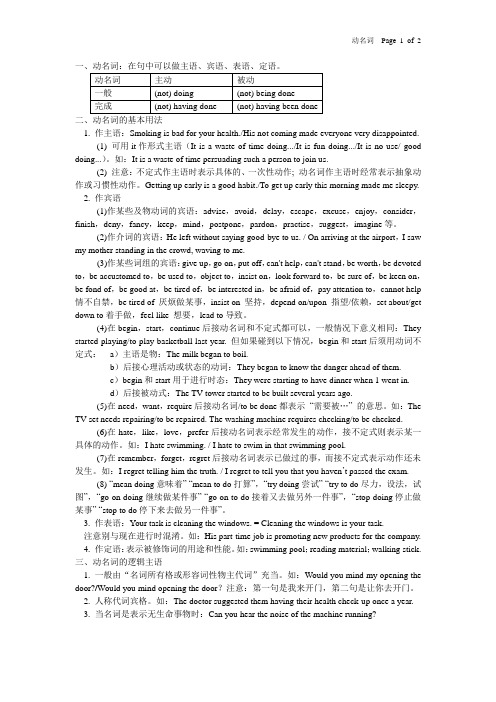
一、动名词:在句中可以做主语、宾语、表语、定语。
二、动名词的基本用法1. 作主语:Smoking is bad for your health./His not coming made everyone very disappointed.(1) 可用it作形式主语(It is a waste of time doing.../It is fun doing.../It is no use/ good doing...)。
如:It is a waste of time persuading such a person to join us.(2) 注意:不定式作主语时表示具体的、一次性动作; 动名词作主语时经常表示抽象动作或习惯性动作。
Getting up early is a good habit./To get up early this morning made me sleepy.2. 作宾语(1)作某些及物动词的宾语:advise,avoid,delay,escape,excuse,enjoy,consider,finish,deny,fancy,keep,mind,postpone,pardon,practise,suggest,imagine等。
(2)作介词的宾语:He left without saying good-bye to us. / On arriving at the airport,I saw my mother standing in the crowd, waving to me.(3)作某些词组的宾语:give up,go on,put off,can't help,can't stand,be worth,be devoted to,be accustomed to,be used to,object to,insist on,look forward to,be sure of,be keen on,be fond of,be good at,be tired of,be interested in,be afraid of,pay attention to,cannot help 情不自禁,be tired of 厌烦做某事,insist on 坚持,depend on/upon 指望/依赖,set about/get down to着手做,feel like 想要,lead to导致。
动名词作主语和宾语

【考例】
1. I can't imagine __________ that with them.
A. do
B. to do
C. being done D. doing
2. She looks forward every spring to __________ the flower-lined garden.(1995 上海高考题)
• 归纳:常用-ing形式作主语的句型有: • It +be +a waste of time doing • 做……是浪费时间的 • It is/was no good/use doing • 做……是没益/用处的 • It is/was hardly/scarcely worth doing • 做……不值得 • It is/was worth/worthwhile doing • 做……是值得的 • There is no doing • 无法…… , 不允许……
13. You must pay attention to ___ the
works of Lu Xun.
A. read
B. reading
C. reader D. be read
14. You should work tonight instead of
_____ TV.
A. to watch B. you watching
A. study
B. be studied
C. studying
D. have studied
12. We are both looking forward to __ next week. A. going on vocation(休假) B. go on vocation C. be going on vocation D. have gone on vocation
动词不定式和动名词作主语和宾语的用法
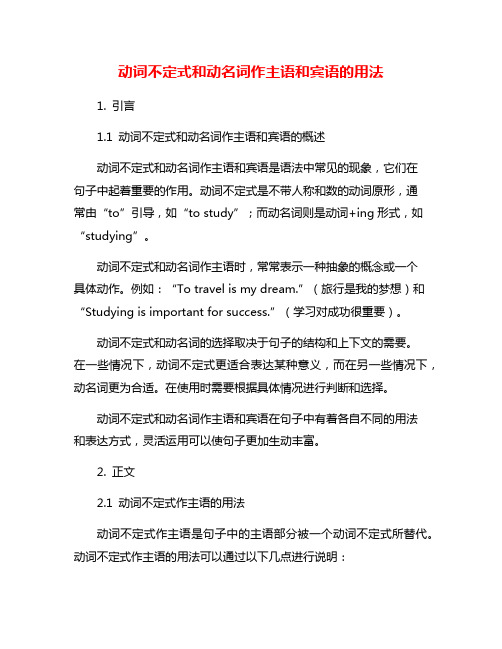
动词不定式和动名词作主语和宾语的用法1. 引言1.1 动词不定式和动名词作主语和宾语的概述动词不定式和动名词作主语和宾语是语法中常见的现象,它们在句子中起着重要的作用。
动词不定式是不带人称和数的动词原形,通常由“to”引导,如“to study”;而动名词则是动词+ing形式,如“studying”。
动词不定式和动名词作主语时,常常表示一种抽象的概念或一个具体动作。
例如:“To travel is my dream.”(旅行是我的梦想)和“Studying is important for success.”(学习对成功很重要)。
动词不定式和动名词的选择取决于句子的结构和上下文的需要。
在一些情况下,动词不定式更适合表达某种意义,而在另一些情况下,动名词更为合适。
在使用时需要根据具体情况进行判断和选择。
动词不定式和动名词作主语和宾语在句子中有着各自不同的用法和表达方式,灵活运用可以使句子更加生动丰富。
2. 正文2.1 动词不定式作主语的用法动词不定式作主语是句子中的主语部分被一个动词不定式所替代。
动词不定式作主语的用法可以通过以下几点进行说明:1. 表示一种行为或动作的意图或目的。
例如:"学习是成功的关键。
"2. 表示一种抽象的概念或观念。
例如:"帮助他人是一种美德。
"3. 在句子中作为主语时,通常放在句首位置。
例如:"抽烟会影响健康。
"4. 动词不定式作主语时,动词不定式通常是不带to的形式。
例如:"去旅行是我的梦想。
"5. 在某些情况下,动词不定式作主语时可以使用to的形式。
例如:"To learn a new language is challenging."动词不定式作主语可以使句子更加简洁明了,同时也可以突出所表达的意思或观点。
在写作中,我们可以适当运用动词不定式作主语来丰富句子结构,提高文章的表达力和逻辑性。
动词不定式和动名词作主语和宾语的用法
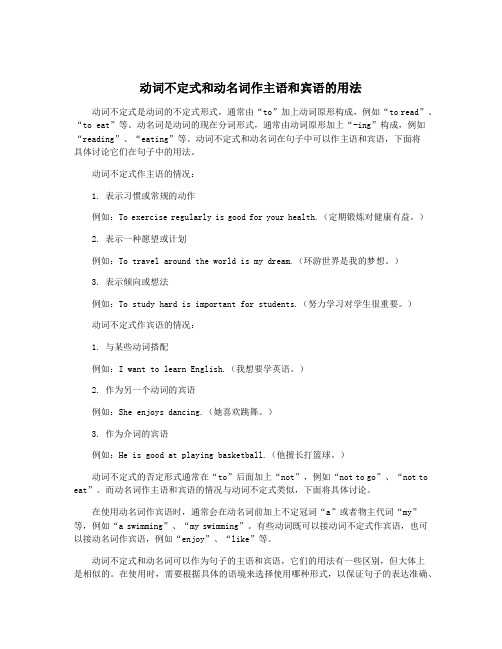
动词不定式和动名词作主语和宾语的用法动词不定式是动词的不定式形式,通常由“to”加上动词原形构成,例如“to read”、“to eat”等。
动名词是动词的现在分词形式,通常由动词原形加上“-ing”构成,例如“reading”、“eating”等。
动词不定式和动名词在句子中可以作主语和宾语,下面将具体讨论它们在句子中的用法。
动词不定式作主语的情况:1. 表示习惯或常规的动作例如:To exercise regularly is good for your health.(定期锻炼对健康有益。
)2. 表示一种愿望或计划例如:To travel around the world is my dream.(环游世界是我的梦想。
)3. 表示倾向或想法例如:To study hard is important for students.(努力学习对学生很重要。
)动词不定式作宾语的情况:1. 与某些动词搭配例如:I want to learn English.(我想要学英语。
)2. 作为另一个动词的宾语例如:She enjoys dancing.(她喜欢跳舞。
)3. 作为介词的宾语例如:He is good at playing basketball.(他擅长打篮球。
)动词不定式的否定形式通常在“to”后面加上“not”,例如“not to go”、“not to eat”。
而动名词作主语和宾语的情况与动词不定式类似,下面将具体讨论。
在使用动名词作宾语时,通常会在动名词前加上不定冠词“a”或者物主代词“my”等,例如“a swimming”、“my swimming”。
有些动词既可以接动词不定式作宾语,也可以接动名词作宾语,例如“enjoy”、“like”等。
动词不定式和动名词可以作为句子的主语和宾语,它们的用法有一些区别,但大体上是相似的。
在使用时,需要根据具体的语境来选择使用哪种形式,以保证句子的表达准确、清晰。
动名词作主语和宾语

05 动名词作主语和宾语的练 习与巩固
单项选择题
总结词
考察动名词作主语和宾语的辨析能力
详细描述
提供一系列单项选择题,要求选择正确的动名词短语作为主语或宾语,以检验学生对动名词作主语和宾语的掌握 程度。
填空题
总结词
考察动名词作主语和宾语的运用能力
要点二
语义重点
动名词在作主语时,强调的是整个动 作或行为本身;而在作宾语时,强调 的是动作或行为的对象或结果。
要点三
使用频率
在实际语言使用中,动名词作主语的频 率相对较高,尤其是在一些固定表达和 习惯用法中,如“Smoking is harmful to health.(吸烟有害健 康。)”中的“Smoking”就是主语。 而宾语则相对较少使用动名词,更多地 使用其他类型的宾语,如名词、代词等。
详细描述
给出句子,要求填写合适的动名词短语作为主语或宾语,以检验学生能否在实际语境中 正确运用动名词作主语和宾语。
翻译题
总结词
考察动名词作主语和宾语的翻译技巧
详细描述
提供一段英文句子,要求将其中的动名词短 语翻译成中文,并保持原意不变,以检验学 生对动名词作主语和宾语的翻译能力。
THANKS FOR WATCHING
习惯用法
习惯用法是指某些动词在特定语境下 习惯性地使用动名词形式。例如, “He recommended me buying a new car”中,“buying a new car”是习惯用法,表示“他建议我 买一辆新车”。
VS
习惯用法通常与特定的动词或短语相 关,反映了语言使用者的习惯和约定 俗成的表达方式。
动词不定式和动名词作主语和宾语的用法

动词不定式和动名词作主语和宾语的用法动词不定式和动名词都可以作为句子的主语和宾语。
它们通常可以表示某个动作或状态,并且在句子中起着名词的作用。
下面将分别介绍动词不定式和动名词作主语和宾语的用法。
1. 动词不定式作主语和宾语动词不定式是由动词原形加上"to"构成的结构,常常可以作为主语和宾语。
动词不定式作主语时,常常表示一个具体的行为或动作,可以引出句子的主要内容。
例如:"To travel around the world" is my dream.("环游世界"是我的梦想)动词不定式作主语时,常常放在句子的开头或者结尾,有时也可能会出现在句子的中间。
动词不定式还可以表示时间、原因、目的、结果等。
例如:To finish the work early is important.(早点完成工作是很重要的)I went to the shop to buy some food.(我去商店是为了买一些食物)动词不定式也可以作为句子的宾语。
在这种情况下,动词不定式通常紧跟在及物动词后面,充当动词的宾语。
例如:She likes to listen to music.(她喜欢听音乐)常见的及物动词后跟不定式的有:like, want, hope, expect, need, plan, promise, decide等。
例如:I want to visit London next year.(我想明年去伦敦)She decided to study abroad.(她决定出国留学)He promised to help me with my homework.(他答应帮我做作业)。
动名词做主语和宾语

功能及用法(作主语)
③在there be结构中作主语,这种结构的意思相当 于“It is impossible to do… ” 如
There is no doing……: 1)这种事开不得玩笑。
Here is __n_o__j_o_k_i_n_g__ about such matter.
2)无法知道他什么时候离开。
(一).(1)只能后接动名词作宾语的动词,常见的有avoid, consider,enjoy,keep,finish,suggest,dislike,delay, escape,imagine,mind,miss,practise,cannot stand等。 如:
1)我不能不去。 I can’t avoid_g_o_i_n_g_._
不及物动词
形式
主动 被 动 主 动
一般式 doing
being done doing
完成式 having done
having been having
done
done
功能及用法(作主语)
1.作主语. 动名词作主语时,句子有三种形式: ①动名词直接置于句首主语的位置上。
②用形式主语it,把真正的主语——动名词结构移置句尾。 但这种句子形式有一定的限制,作表语的只能是某些形容词或少数 名词, 如useful,useless,good,fun;no use,a waste of等。如:
具体的或一次性的动作
__S_w_i_m_m__in__g___(swim)is good for our health. ___T_o_s_w__im______(swim)in this river is not allowed
功能及用法 (用作宾语)
动名词做主语和宾语定

1)作主语
① Doing + v. + …
Writing the book has taken up all his spare time.
Seeing is believing.
1. ______( die ) for people is a glorious thing. 2. ______( talk ) with him is a great pleasure. 3. ______( help ) others is our duty.
不定式VS动名词
• 动名词 习惯性动作或抽象概念 泛指 • 不定式 具体或特定的动作,或是现在 或是将来的动作
• It’s no good eating too much fat. • It’s not good for you to eat so much fat. • I like playing basketball, but I don't like to play basketball this weekend.
• 2)动名词做宾语 • ③有些动词短语后面只能跟动名词做宾语。
• 动名词(短语)还常常跟在短语动词之后,作介词的宾语。 常见的有: • insist on / think of / dream of / object to / hear of / prevent … from / keep … from / stop … from / feel like / look forward to / depend on / thank … for / excuse … for / devote … to / set about / spend … in / get (be) used to … / be fond of / be afraid of / be tired of / succeed in / be interested in / be pr,
动名词用法总结
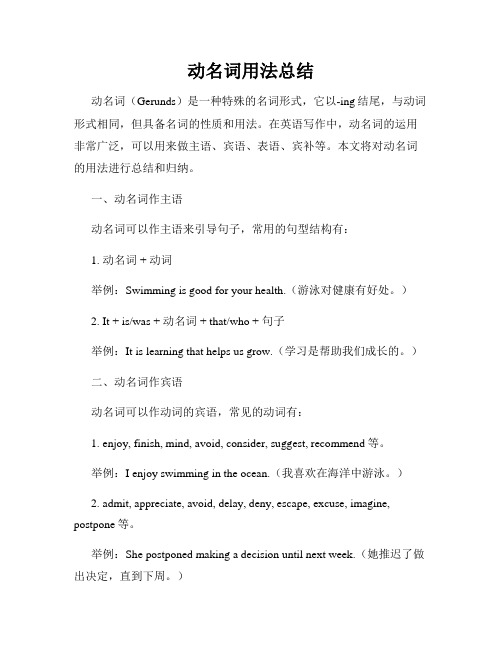
动名词用法总结动名词(Gerunds)是一种特殊的名词形式,它以-ing结尾,与动词形式相同,但具备名词的性质和用法。
在英语写作中,动名词的运用非常广泛,可以用来做主语、宾语、表语、宾补等。
本文将对动名词的用法进行总结和归纳。
一、动名词作主语动名词可以作主语来引导句子,常用的句型结构有:1. 动名词 + 动词举例:Swimming is good for your health.(游泳对健康有好处。
)2. It + is/was + 动名词 + that/who + 句子举例:It is learning that helps us grow.(学习是帮助我们成长的。
)二、动名词作宾语动名词可以作动词的宾语,常见的动词有:1. enjoy, finish, mind, avoid, consider, suggest, recommend等。
举例:I enjoy swimming in the ocean.(我喜欢在海洋中游泳。
)2. admit, appreciate, avoid, delay, deny, escape, excuse, imagine, postpone等。
举例:She postponed making a decision until next week.(她推迟了做出决定,直到下周。
)三、动名词作表语动名词可以作表语,常与be动词连用,表示主语的特征或状态。
举例:Her hobby is painting.(她的爱好是绘画。
)举例:My dream is traveling around the world.(我的梦想是环游世界。
)四、动名词作宾补在某些动词后面,可以加上动名词作宾补来表示动作的完整性。
常见的动词有:see, watch, hear, feel, notice, observe等。
举例:I saw him crossing the street.(我看到他穿过马路。
动名词的用法总结详解英语语法

动名词的用法总结详解英语语法动名词词在句子中可以用作主语、表语、宾语、补足语、定语、状语等。
以下是店铺为大家整理的动名词的用法,希望能帮助大家更好地掌握动名词,提高英语水平。
动名词的用法:作主语1、动名词是由动词变化而来,所以,动名词的意义也是表示某个动作或事情。
例如: Reading English aloud in the morning will do you a lot of good.Cheating on an exam ruins one's character. 考试作弊毁坏人的性格。
2、动名词作主语时,对于一些比较长的动名词短语,一般采用"It is …"和"There is …"两种句式来表示。
例如:It is no use waiting for him any longer. 等他是没有用的。
There is no joking about such matters. 这种事开不得玩笑。
3、动名词作主语与不定式作主语的区别:动名词作主语通常表示抽象的或泛指的动作,一般不与特定的动作执行者联系在一起;不定式作主语通常表示具体的动作或行为,往往与特定的动作执行者联系在一起,如:It’s no use crying over spilt milk. (抽象)He realized that to go on like this was no use. (具体)4、在实际运用中,一般可以互换,差异不大。
但在下列几种情况中不能互换:当表语是动名词时,主语也要用动名词;当表语是不定式时,主语也要用不定式,如: Seeing is believing. = To see is to believe.5、动名词和不定式作主语,一般都可以使用形式主语it,而将动名词或不定式放在句尾。
但是在下列句型中,一般宜用动名词,不宜用不定式来代替:It’s no use doing … It’s no good doing…It’s a waste of time doing …动名词的用法:作表语1、动名词作表语与现在分词作表语的区别:动名词作表语时相当于名词,说明主语的含义及内容,它与主语是同等关系,主语与表语互换位置不影响句子的基本含义,但不可用副词来修饰。
动名词的用法
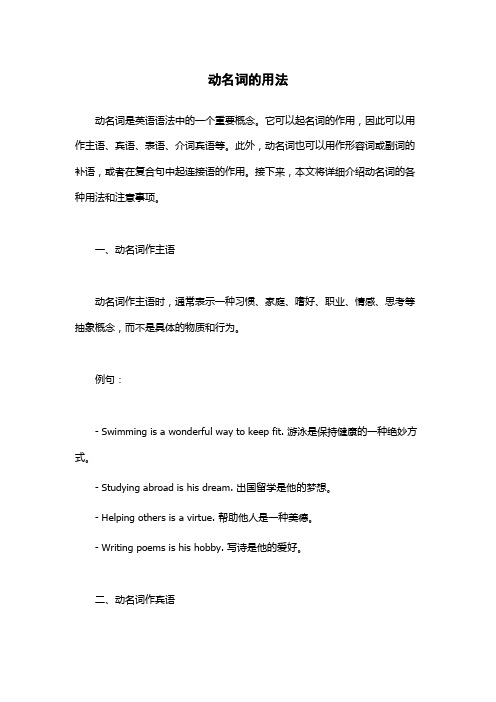
动名词的用法动名词是英语语法中的一个重要概念。
它可以起名词的作用,因此可以用作主语、宾语、表语、介词宾语等。
此外,动名词也可以用作形容词或副词的补语,或者在复合句中起连接语的作用。
接下来,本文将详细介绍动名词的各种用法和注意事项。
一、动名词作主语动名词作主语时,通常表示一种习惯、家庭、嗜好、职业、情感、思考等抽象概念,而不是具体的物质和行为。
例句:- Swimming is a wonderful way to keep fit. 游泳是保持健康的一种绝妙方式。
- Studying abroad is his dream. 出国留学是他的梦想。
- Helping others is a virtue. 帮助他人是一种美德。
- Writing poems is his hobby. 写诗是他的爱好。
二、动名词作宾语动名词作宾语时,通常表示一种行为、活动、计划等。
常见的动词包括admit, appreciate, avoid, postpone, practice等。
例句:- I enjoy reading books. 我喜欢读书。
- He avoids speaking in public. 他避免在公众场合讲话。
- The company is considering expanding overseas. 公司正在考虑扩展海外市场。
- She decided to postpone her wedding. 她决定推迟婚礼。
三、动名词作表语动名词作表语时,通常表示一种状态或特点。
常见的动词包括 be, become, seem, feel等。
例句:- Her favorite leisure activity is swimming. 她最喜欢的休闲活动是游泳。
- The idea of traveling alone seemed daunting to him. 独自旅行的想法对他来说看起来很艰巨。
动名词用法
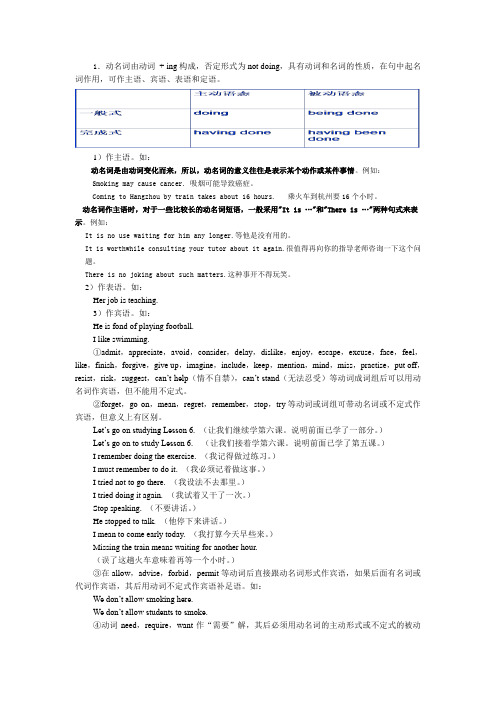
1.动名词由动词+ ing构成,否定形式为not doing,具有动词和名词的性质,在句中起名词作用,可作主语、宾语、表语和定语。
1)作主语。
如:动名词是由动词变化而来,所以,动名词的意义往往是表示某个动作或某件事情。
例如:Smoking may cause cancer. 吸烟可能导致癌症。
Coming to Hangzhou by train takes about 16 hours. 乘火车到杭州要16个小时。
动名词作主语时,对于一些比较长的动名词短语,一般采用"It is …"和"There is …"两种句式来表示。
例如:It is no use waiting for him any longer.等他是没有用的。
It is worthwhile consulting your tutor about it again.很值得再向你的指导老师咨询一下这个问题。
There is no joking about such matters.这种事开不得玩笑。
2)作表语。
如:Her job is teaching.3)作宾语。
如:He is fond of playing football.I like swimming.①admit,appreciate,avoid,consider,delay,dislike,enjoy,escape,excuse,face,feel,like,finish,forgive,give up,imagine,include,keep,mention,mind,miss,practise,put off,resist,risk,suggest,can’t help(情不自禁),can’t stand(无法忍受)等动词成词组后可以用动名词作宾语,但不能用不定式。
②forget,go on,mean,regret,remember,stop,try等动词或词组可带动名词或不定式作宾语,但意义上有区别。
动名词的三种用法
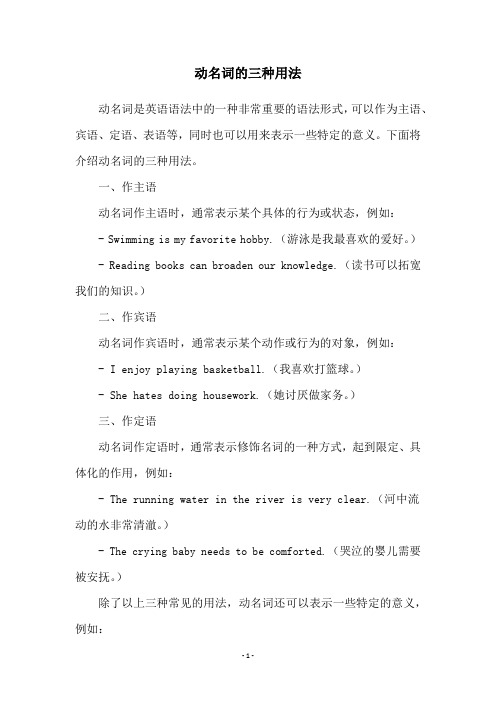
动名词的三种用法动名词是英语语法中的一种非常重要的语法形式,可以作为主语、宾语、定语、表语等,同时也可以用来表示一些特定的意义。
下面将介绍动名词的三种用法。
一、作主语动名词作主语时,通常表示某个具体的行为或状态,例如:- Swimming is my favorite hobby.(游泳是我最喜欢的爱好。
) - Reading books can broaden our knowledge.(读书可以拓宽我们的知识。
)二、作宾语动名词作宾语时,通常表示某个动作或行为的对象,例如:- I enjoy playing basketball.(我喜欢打篮球。
)- She hates doing housework.(她讨厌做家务。
)三、作定语动名词作定语时,通常表示修饰名词的一种方式,起到限定、具体化的作用,例如:- The running water in the river is very clear.(河中流动的水非常清澈。
)- The crying baby needs to be comforted.(哭泣的婴儿需要被安抚。
)除了以上三种常见的用法,动名词还可以表示一些特定的意义,例如:- V-ing + V-ed:表示同时或顺序进行的两个动作,如:He sat there, reading a book and drinking tea.(他坐在那里,一边看书一边喝茶。
)- V-ing + to-inf:表示动作的目的,如:He went there, hoping to meet his friend.(他去那里,希望能见到他的朋友。
)- V-ing + V-ing:表示两个动作同时进行,如:She was walking down the street, humming a song.(她一边走在街上,一边哼着歌。
)总之,动名词的用法非常丰富多样,对于英语学习者来说,掌握好动名词的使用,能够更加流利自如地表达自己的意思。
动名词用法及例句
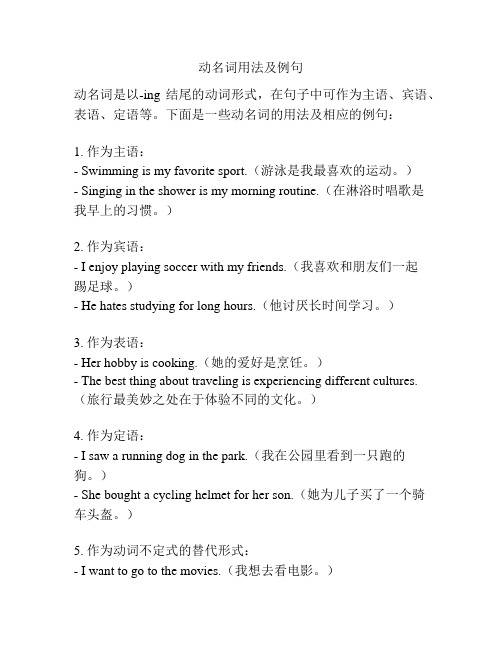
动名词用法及例句动名词是以-ing结尾的动词形式,在句子中可作为主语、宾语、表语、定语等。
下面是一些动名词的用法及相应的例句:1. 作为主语:- Swimming is my favorite sport.(游泳是我最喜欢的运动。
)- Singing in the shower is my morning routine.(在淋浴时唱歌是我早上的习惯。
)2. 作为宾语:- I enjoy playing soccer with my friends.(我喜欢和朋友们一起踢足球。
)- He hates studying for long hours.(他讨厌长时间学习。
)3. 作为表语:- Her hobby is cooking.(她的爱好是烹饪。
)- The best thing about traveling is experiencing different cultures.(旅行最美妙之处在于体验不同的文化。
)4. 作为定语:- I saw a running dog in the park.(我在公园里看到一只跑的狗。
)- She bought a cycling helmet for her son.(她为儿子买了一个骑车头盔。
)5. 作为动词不定式的替代形式:- I want to go to the movies.(我想去看电影。
)- I want going to the movies.(我喜欢看电影。
)需要注意的是,在某些情况下,动名词也可用来表示动作的结果或持续状态,这时常与be动词连用,例如:- The car needs washing.(这辆车需要洗。
)- He was seen dancing at the party.(他在派对上被看到正在跳舞。
)。
- 1、下载文档前请自行甄别文档内容的完整性,平台不提供额外的编辑、内容补充、找答案等附加服务。
- 2、"仅部分预览"的文档,不可在线预览部分如存在完整性等问题,可反馈申请退款(可完整预览的文档不适用该条件!)。
- 3、如文档侵犯您的权益,请联系客服反馈,我们会尽快为您处理(人工客服工作时间:9:00-18:30)。
第二类:意义不同
go on doing go on to do
mean doing mean to do
stop doing stop to do
继续做原来做的事 接着做另一件事 意味着要做某事 想要做某事 停止做某事
停下来去做某事
• try to do 努力,企图做某事 • try doing 试着做某事
and free of disease. anic farmers prefer using natural
waste from animals as fertilizer.
一、动名词作动词宾语
(一) 有些动词只能后接动名词作宾语;
(二) 有些动词既可后接动名词也可接不定 式作宾语。(没有区别)
(三) 有些动词既可后接动名词也可接不定 式作宾语.(有区别)
(一).只能接动名词作宾语的动词
avoid finish escape practise
consider suggest imagine lead to
enjoy keep dislike delay mind miss focus on
It is no use arguing with him about such a matter.
动名词作主语
第一部分 动名词做主语
往往表示经常性、习惯性的动作。
形式:①动名词直接置于句首主语的位置上。
1.玩火危险Playing with fire is dangerous.
2 Reading
谓语动作之前。 Having finished the task ahead of time give
the boy a good chance.
2..否定形式:在动名词前加not,即not doing 完成式的否定not having done
注意:There is no need to do sth 干……没必要,在此句式中to do 不可换 为doing.. 没有必要告诉她。
There is no need to tell her.
to do or v-ing?
____P_l_a_y_in_g_(play)with fire is dangerous.
即学活用:
1.I often practise speaking(speak) English.
2.I can’t avoid going (go)there with him.
3.He decided to experiment(experiment) with scientific methods of farming.
第一类 :forget, regret, remember
后跟动名词,表示已经发生的动作;
后跟不定式表示将要发生的动作。
• I forgot _w__ri_ti_n_g_to her.我忘了曾经给 她写过信。
• I forgot __t_o__w_r_it_e__to her about it.我 忘了给她写信。
5.I am used to ___g_e_t_ti_n_g_u_p___ early.(get up)
6.We have finished Part 1.Let’s go on ___to__le_a_r_n_Part2(learn)
二、动名词作介词宾语
1.在含有介词的动词短语之后: be interested in, be fond of, think of, be proud of, dream of 2.在单个介词之后:
• be used to do 被用于做某事 • be used to doing 习惯于做某事
• can’t help to do 不能帮忙某事 • can’t hep doing 忍不住做某事
1.He felt tired and stopped to have a rest.(have a rest)
2. need/want/require/deserve doing sth.
=need/want/require/deserve to be done.
4 ) The bike requires repairing(repair) The bike requires to be repaired .
(读一本好的小说)
③在there be结构中作主语,这种结构的 意思相当于“It is impossible to do… ”
There is no doing……
• 1)这种事开不得玩笑。
There is __n_o__jo__k_in_g___ about such matter.
2)无法知道他什么时候离开。 There wasn_o__k_n_o_w_i_n_gwhen he would leave.
with ,of, for,without, against, to, in, besides ,after,before,by,of ,for
1.She left without saying (say)goodbye to us. 2.What have you been doing besides writing.
教学目标
1.记住动名词做主语和宾语的基本 用法
2.记住动名词的不同形式 3.能灵活使用动名词的知识解题
观察下列句子,他们的共同点是什么?
Since then, finding ways to grow more rice has been his life goal.
Just dreaming for things, however, costs nothing.
5 ) My hair needs cutting (cut)
My hair needs to be cut
.
(三) 有些动词既可后接动名词也可接不定式 作宾语。(有区别) forget, go on, mean, regret, remember,
stop, try, be used to, can‘t help
your English . 6. I like your way of doing (do) the work.
动名词的几种特殊形式
1.动名词的时态
一般式 doing :1.动名词表示的动作时间不明 确2.与谓语动作同时或之后发生。
I enjoy playing football. He is considering going abroad next year. 完成式having done:强调动名词的动作发生在
第二部分:动名词作宾语
• 观察下列句子:
1.Yuan longping enjoys listening to music ,swimming and reading.
2.He does’t care about being famous. 3.They focus on keeping their soil rich
(write) the book ? 3.Give me a call before leaving (leave)
home. 4.After playing (play) chess,we watched TV. 5.Only byworking (work) hard can you improve
• I remember__s_e_e_i_n_g_ (see) you somewhere in Beijing.
• Remember _t_o_c_a_l_l_me tonight.(call) • He regretted___to__c_h_e_a_t_ in the
exam.(cheat) • I regret _to__s_a_y__that we can’t stay
Spending money on himself or leading a comfortable life also means very little to him.
Over the past half century, using chemical fertilizers has become very common in farming
表示一般或抽象的多次行为
Be careful! __T_o_p__la_y(play)with fire will be dangerous.
具体的或一次性的动作
__S_w_i_m_m__in__g___(swim)is good for our health. ___T_o_s_w__im______(swim)in this river is not allowed
be fond of get used to be good at feel like
give up cannot stand be worth pay attention to devote to dream of insist on look forward to
,
常跟动词ing作宾语的动词歌诀:
注意和跟动词不定式的词的区分
决心学会有希望 decide learn wish hope 同意计划莫假装 agree plan pretend 忘记拒绝会失败 forget refuse fail 准备设法来帮忙 prepare manage help 提供请求负担起 offer beg afford 记得阻止理应当 remember stop be supposed 以上后跟不定式 劝君牢记永不忘
4.Tom looked forward to seeing the film this weekend.
(二) 有些动词既可后接动名词也可接不定式
作宾语.(没大区别)
1.一些表示喜好或开始动作的动词 like,love,hate, prefer ,intend ,begin, start continue等,
